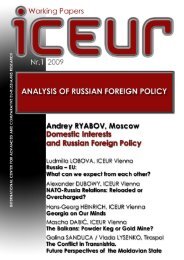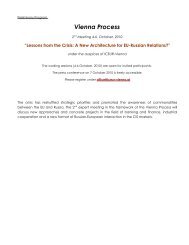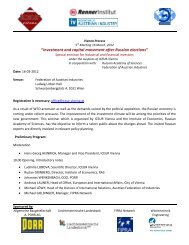Address - International Center for Advanced and Comparative EU ...
Address - International Center for Advanced and Comparative EU ...
Address - International Center for Advanced and Comparative EU ...
Create successful ePaper yourself
Turn your PDF publications into a flip-book with our unique Google optimized e-Paper software.
Alex<strong>and</strong>er DYNKIN<br />
Global Turmoil: Challenges <strong>for</strong> Russia<br />
That is why we have to be very cautious regarding <strong>for</strong>ecasts. Many complex uncertainties remain. When will<br />
credit markets recover What will happen with the toxic assets What will the recovery of the U.S. economy<br />
be like: quick or lingering What will happen to the Chinese economy It is obvious already that China,<br />
notwithst<strong>and</strong>ing high growth rates, plunged into difficult social <strong>and</strong> political problems <strong>and</strong> challenges.<br />
Suffice it to say that there are 25 million migrant workers from rural areas who cannot find jobs in the cities,<br />
additionally, nobody looks <strong>for</strong> them in the villages anymore. With 1 million unemployed university<br />
graduates in the last year <strong>and</strong> 5 million more in 2009, the problem in labor <strong>and</strong> consumer markets can<br />
become serious <strong>for</strong> as many as 1,300 million people in China. Can new leading emerging economies (known<br />
as the BRIC group) replace the USA <strong>and</strong> the <strong>EU</strong> as the world economy “locomotives” It is clear that in<br />
2009 the expected economic growth of China by 8.5% <strong>and</strong> India (by 4.2%) in t<strong>and</strong>em with an estimated<br />
economic decrease of Russia by 7.5% <strong>and</strong> Brazil by approximately 1% would be insufficient to compensate<br />
the economic slump in the developed economies. The comparative analysis of the current <strong>and</strong> previous<br />
world scale economic crises may help in tracking the answers.<br />
The global economy – entering the era of changes in the world order<br />
To all appearance we have entered the next crisis era, an era of changes in the world order. We know that the<br />
future grows out of the present, while the present comes out of the past. After each serious crisis, a reshuffle<br />
of the balance of power in the world <strong>and</strong> in international relations occurs. That happened after the crisis of<br />
1929 – 1932 <strong>and</strong> the Great Depression, which followed it. Or, after the crises of 1969 – 1970. In the first case,<br />
the Second World War was triggered, which generated a “bipolar world”. In the second case, the crises were<br />
conducive to the mobilization of American society <strong>and</strong> economic renewal. As a result, the United States<br />
managed to occupy the position of the sole superpower. It is likely that new global changes in international<br />
politics will take place now as well.<br />
Nevertheless, I categorically disagree with the thesis that the crisis of 2008-2010 can be compared to the<br />
Great Depression of 1929-1930. The framework of this article gives no space <strong>for</strong> detailed argument. But one<br />
can see the principal differences – basically less developed productive <strong>for</strong>ces, absence of global trade,<br />
financial <strong>and</strong> in<strong>for</strong>mation spaces, authoritarian political <strong>and</strong> self-sufficient economic regimes in a number of<br />
main world economic actors (Germany <strong>and</strong> Italy economically dominated part of Europe <strong>and</strong> Japan<br />
dominated parts of Asia, not to mention the Soviet Union at the time).<br />
On the contrary, a recent analysis by IMEMO RAS demonstrates significant parallels between the current<br />
geo-economic <strong>and</strong> geopolitical situation <strong>and</strong> the one, which the world lived through in the 1970s (see<br />
Schedule 1).<br />
.This comparison brought us closer to a correct picture of reality, but questions still remain.<br />
Will a new world order be more stable What will a new world order be like How will the leading positions<br />
of the US in the world change We may come closer to the answers to these questions by analyzing the<br />
political consequences of the crisis at the beginning of the 1970s. Of course, all historical parallels are<br />
relative. Their uncritical usage is dangerous. Nevertheless, research has practically no other possibilities <strong>for</strong><br />
analysis <strong>and</strong> prognosis than departing from a comparison with the historic precedents.<br />
It is well known that the financial crisis, which shook the United States <strong>and</strong> other countries in 1969 – 1970<br />
was preconditioned, on the one h<strong>and</strong>, by increased competition between the United States <strong>and</strong> Japan <strong>and</strong><br />
Germany, <strong>and</strong> on the other h<strong>and</strong>, by an overstraining of the American economy during the Vietnam war. The<br />
current crisis of 2008-2009 in many respects is caused, on the one h<strong>and</strong>, by the economic rivalry of the<br />
United States with China <strong>and</strong> other Asian countries, but also by a financial overload of the US in the course<br />
of protracted warfare in Afghanistan <strong>and</strong> Iraq on the other. Still, as well as in the 1970s, nobody can seriously<br />
contend American economic, political <strong>and</strong> military leadership. But today, similar to 40 years ago, the<br />
American Administration seems to be running out of cash.<br />
The staggering economic development of China <strong>and</strong> the gradual growth of its political impact is an<br />
important factor. But in the 1970s, the situation was more or less similar: on the one h<strong>and</strong>, there was the<br />
rapid, export-based economic growth of Japan, then of the Republic of Korea, <strong>and</strong> on the other h<strong>and</strong>, the<br />
growth of the political <strong>and</strong> economic might of the Soviet Union. Nevertheless, after a temporary decrease of<br />
America´s political role in the world during the 1970s, we saw a recovery of US power. Of course, it was<br />
achieved by mobilization <strong>and</strong> re<strong>for</strong>ms in different spheres of social life. But nowadays, American society<br />
4 IC<strong>EU</strong>R-Vienna Working Papers 2|2009









